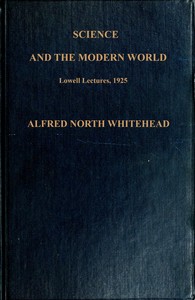Science and the modern world by Alfred North Whitehead
"Science and the Modern World" by Alfred North Whitehead is a series of philosophical lectures presented in the early 20th century, specifically during the 1920s. This work examines the evolution of scientific thought and its profound impact on modern Western culture, framing science as a central force in shaping contemporary philosophy, religion, and ethical perspectives. Whitehead seeks to elucidate the historical context that led to the emergence of modern science and discusses
how this scientific mindset has redefined humanity's understanding of nature and existence. At the start of the text, the author lays out his intention to explore the origins of modern scientific thought, tracing its roots back to significant intellectual upheavals that occurred during the Renaissance and the Reformation. He introduces critical figures such as Copernicus and Galileo, who challenged the accepted cosmologies of their times, and illustrates the transition from a predominantly theological worldview to one shaped by empirical observation and mathematical reasoning. Whitehead emphasizes the gradual yet transformative nature of this shift, asserting that the modern scientific mentality has recontextualized not only how people engage with nature but also the underlying metaphysical beliefs that influence wider societal structures. (This is an automatically generated summary.)
Read or download for free
| How to read | Url | Size | |||
|---|---|---|---|---|---|
| Read now! | https://www.gutenberg.org/ebooks/68611.html.images | 596 kB | |||
| EPUB3 (E-readers incl. Send-to-Kindle) | https://www.gutenberg.org/ebooks/68611.epub3.images | 418 kB | |||
| EPUB (older E-readers) | https://www.gutenberg.org/ebooks/68611.epub.images | 415 kB | |||
| EPUB (no images, older E-readers) | https://www.gutenberg.org/ebooks/68611.epub.noimages | 411 kB | |||
| Kindle | https://www.gutenberg.org/ebooks/68611.kf8.images | 1.2 MB | |||
| older Kindles | https://www.gutenberg.org/ebooks/68611.kindle.images | 1.2 MB | |||
| Plain Text UTF-8 | https://www.gutenberg.org/ebooks/68611.txt.utf-8 | 513 kB | |||
| Download HTML (zip) | https://www.gutenberg.org/cache/epub/68611/pg68611-h.zip | 2.1 MB | |||
| There may be more files related to this item. | |||||
Similar Books
About this eBook
| Author | Whitehead, Alfred North, 1861-1947 |
|---|---|
| LoC No. | 25021832 |
| Title | Science and the modern world |
| Original Publication | United States: The MacMillan Company,1925. |
| Series Title | Lowell Lectures, 1925 |
| Contents | The origins of modern science -- Mathematics as an element in the history of thought -- The century of genius -- The eighteenth century -- The romantic reaction -- The nineteenth century -- Relativity -- The quantum theory -- Science and philosophy -- Abstraction -- God -- Religion and science -- Requisites for social progress. |
| Credits | KD Weeks, Steve Mattern and the Online Distributed Proofreading Team at https://www.pgdp.net (This file was produced from images generously made available by The Internet Archive) |
| Reading Level | Reading ease score: 52.1 (10th to 12th grade). Somewhat difficult to read. |
| Language | English |
| LoC Class | Q: Science |
| Subject | Science |
| Category | Text |
| EBook-No. | 68611 |
| Release Date | Jul 25, 2022 |
| Copyright Status | Public domain in the USA. |
| Downloads | 651 downloads in the last 30 days. |
| Project Gutenberg eBooks are always free! | |

